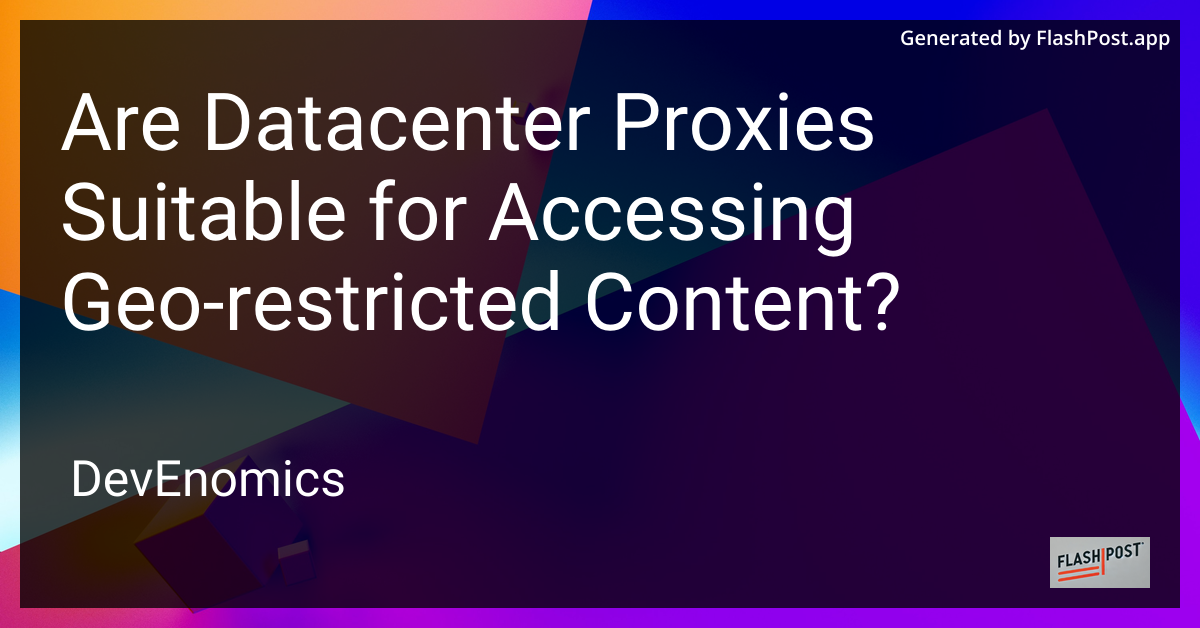

Are Datacenter Proxies Suitable for Accessing Geo-restricted Content?
In the world of web browsing and online streaming, encountering geo-restricted content has become increasingly common. As more internet users look for ways to bypass these restrictions, proxies have emerged as a favored solution. Among the various types of proxies, datacenter proxies are often highlighted for their speed and reliability. But are they actually suitable for accessing geo-restricted content? Let’s delve into the key aspects of datacenter proxies and evaluate their effectiveness for this purpose.
Understanding Datacenter Proxies
Datacenter proxies are not affiliated with an internet service provider (ISP). Instead, they originate from a secondary corporation and provide proxy servers through data centers. These proxies are known for their high speed and capacity to handle large volumes of requests due to the robust infrastructure of data centers. However, the very nature of their operation can present certain challenges.
The Pros of Using Datacenter Proxies
-
Speed and Performance: Since datacenter proxies operate on powerful servers, they boast high speeds, which make them ideal for tasks requiring quick data retrieval.
-
Scalability: Because they aren’t tied to an ISP, datacenter proxies can handle multiple connections simultaneously. This capability is particularly beneficial for businesses conducting large-scale scraping or data mining.
-
Cost-Effectiveness: Generally, datacenter proxies are cheaper than residential proxies, making them an attractive option for budget-conscious users.
The Cons of Using Datacenter Proxies for Geo-Restrictions
-
Detection by Websites: Many websites that impose geo-restrictions are adept at detecting datacenter IP addresses. Because these IPs are not associated with an ISP, they often get identified and blocked.
-
Lack of Anonymity: Datacenter proxies may not provide the same level of anonymity as residential or mobile proxies. This reduced anonymity can be a concern for users looking to circumvent regional blocks securely.
-
Limited Geographic Options: While datacenter proxies are available in various locations, they may not cover as many regions globally as residential proxies. This limitation could hinder effective access to content restricted to specific locales.
Exploring Alternative Proxy Solutions
Considering the potential downsides of datacenter proxies for accessing geo-restricted content, users may explore alternative options like mobile proxy services. Mobile proxies provide IP addresses that originate from mobile networks, offering higher anonymity and a broader range of geographic locations.
Moreover, using proxies also raises security and legal considerations. For instance, those interested in using proxies with platforms like TikTok should be aware of proxy security concerns. Similarly, users must stay informed about the legality of using proxies with Shopify in 2025.
Conclusion: Are Datacenter Proxies Right for You?
While datacenter proxies offer notable advantages in speed and cost, they may fall short when it comes to bypassing geo-restrictions due to detectability issues. Users must weigh these factors against their specific needs and may want to consider more anonymous options like residential or mobile proxies, especially in scenarios where stealth and wider geographical accessibility are crucial.
Ultimately, the suitability of datacenter proxies for accessing geo-restricted content depends on the specific restrictions faced and the level of privacy required. Evaluating these aspects carefully will ensure you choose the most effective proxy solution for your needs.
